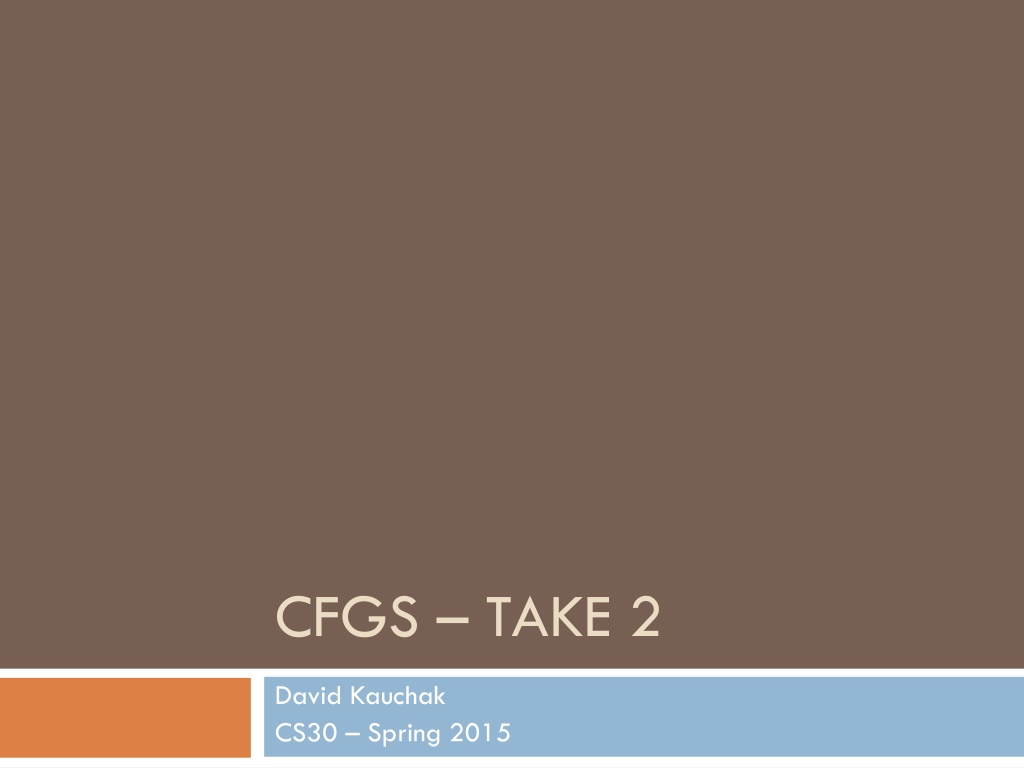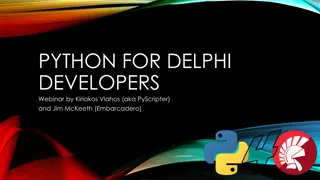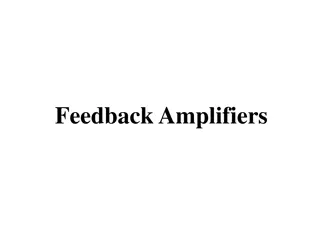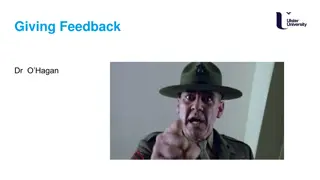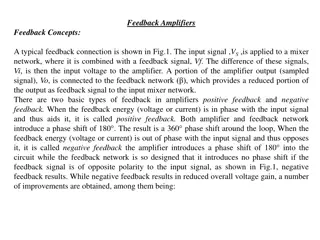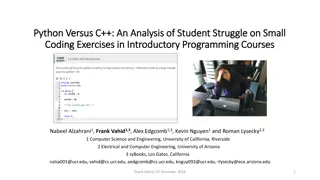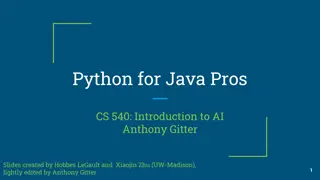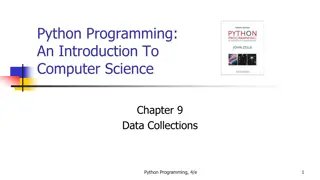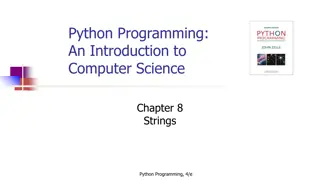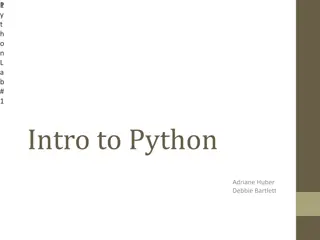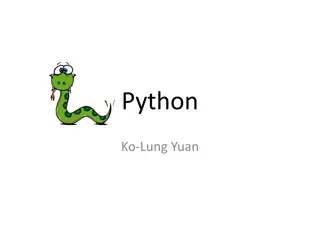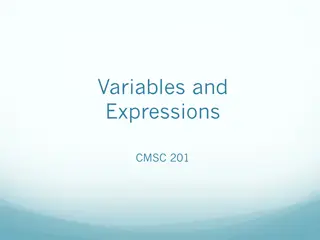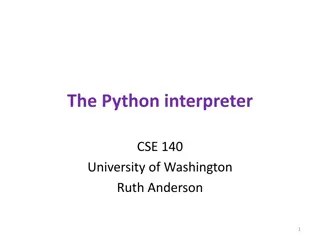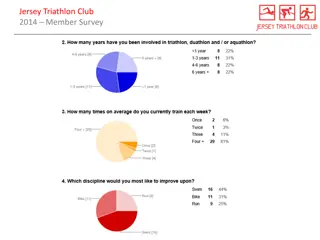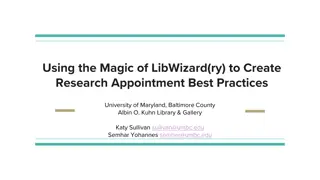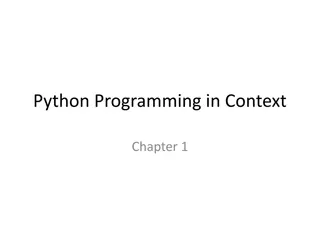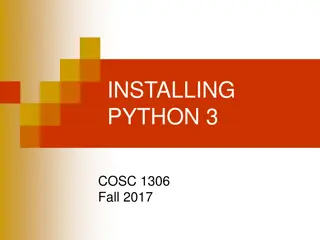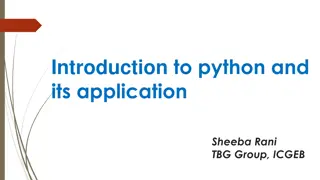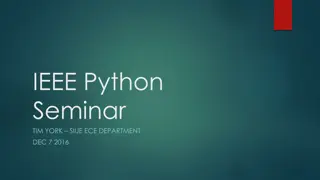Feedback and Suggestions for Improving the Python Course
Course participants provide feedback on the Python course, expressing a desire for a more comprehensive pace, additional mentor sessions, and peer coding opportunities. They appreciate learning Python but suggest improvements for a better learning experience.
Download Presentation

Please find below an Image/Link to download the presentation.
The content on the website is provided AS IS for your information and personal use only. It may not be sold, licensed, or shared on other websites without obtaining consent from the author. Download presentation by click this link. If you encounter any issues during the download, it is possible that the publisher has removed the file from their server.
E N D
Presentation Transcript
CFGS TAKE 2 David Kauchak CS30 Spring 2015
Admin Today s mentor hours moved to 6-8pm Assignment 4 graded Assignment 5 - how s it going? - part A due tonight at 11:59pm - part B due Friday at 6pm
Course feedback Thanks!
Favorite thing about the course Learning Python. It's pretty dope.
Things to be improved Sometimes a lot of the lecture material is covered too quickly. I would appreciate a slightly more comprehensive pace, and easier first examples. Maybe focusing more time on reviewing the concepts that we have already learned just to make sure that the idea is really solidified it so that we can use it in a program. Honestly, it's a little slow. But I don't really know how to improve that given that I know literally nothing about coding and need to be walked through things.
Things to be improved Also I would really enjoy more mentor sessions, on Monday, for example. Or even on Friday. It would be helpful to have a tutor/ mentor session on Sunday nights so that if we run into questions/ issues on homework over the weekend, there is somewhere to get help before Tuesday, aka halfway through the week.
Things to be improved I was talking to a friend about how it'd be really nice to have a buddy to share how I code a function. I thought by watching another person code in a way that is different/similar to yours, you can understand the logic/style better and faster.
Things to be improved We haven't done that many assignments, but one of them had some grading I didn't understand. I feel like that was an anomaly though.
Things to be improved More high-five breaks!
Other thoughts I would really like to do Turing Machines in this class I think they're fun & have interesting connections/applications to computation/ the human mind
Grammars Language view: A grammar is a set of structural rules that govern the composition of sentences, phrases and words. Computational view: A grammar (often called a formal grammar ) is a set of rules that describe what strings are valid in a formal language.
CFG production rules S NP VP S NP VP left hand side (single symbol) right hand side (one or more symbols)
CFG example Grammars generate or derive strings: S A B C A I B really B really, B C like cs S
CFG example Grammars generate or derive strings: S A B C A I B really B really, B C like cs S We can apply a rule by substituting the symbol on the left hand side with the symbols on the right
CFG example Grammars generate or derive strings: S A B C A I B really B really, B C like cs A B C We can apply a rule by substituting the symbol on the left hand side with the symbols on the right
CFG example Grammars generate or derive strings: S A B C A I B really B really, B C like cs A B C We can apply a rule by substituting the symbol on the left hand side with the symbols on the right
CFG example Grammars generate or derive strings: S A B C A I B really B really, B C like cs A really C We can apply a rule by substituting the symbol on the left hand side with the symbols on the right
CFG example Grammars generate or derive strings: S A B C A I B really B really, B C like cs A really C We can apply a rule by substituting the symbol on the left hand side with the symbols on the right
CFG example Grammars generate or derive strings: S A B C A I B really B really, B C like cs A really like cs We can apply a rule by substituting the symbol on the left hand side with the symbols on the right
CFG example Grammars generate or derive strings: S A B C A I B really B really, B C like cs A really like cs We can apply a rule by substituting the symbol on the left hand side with the symbols on the right
CFG example Grammars generate or derive strings: S A B C A I B really B really, B C like cs I really like cs We can apply a rule by substituting the symbol on the left hand side with the symbols on the right
CFG example Grammars generate or derive strings: S A B C A I B really B really, B C like cs I really like cs We can apply a rule by substituting the symbol on the left hand side with the symbols on the right No more rules apply, so we re done!
CFG example Grammars generate or derive strings: S A B C A I B really B really, B C like cs I really like cs We can apply a rule by substituting the symbol on the left hand side with the symbols on the right
CFG example Grammars generate or derive strings: S A B C A I B really B really, B C like cs A really, B C We can apply a rule by substituting the symbol on the left hand side with the symbols on the right
CFG example Grammars generate or derive strings: S A B C A I B really B really, B C like cs A really, really, B C We can apply a rule by substituting the symbol on the left hand side with the symbols on the right
CFG example Grammars describe a language, i.e. the strings (aka sentences) that are part of that language S A B C A I B really B really, B C like cs I really, really, like cs
What language does this represent? S aS S E E bE E b
What language does this represent? S aS S E E bE E b Two options S
What language does this represent? S S aS S E E bE E b aS
What language does this represent? aS S aS S E E bE E b aaS
What language does this represent? aaS S aS S E E bE E b aaaS - Can do this as many times as we want - Keeps adding more a s to the front
What language does this represent? aaaS S aS S E E bE E b aaaE Eventually, apply second rule
What language does this represent? S aS S E E bE E b aaaE Two options
What language does this represent? aaaE S aS S E E bE E b aaabE
What language does this represent? aaabE S aS S E E bE E b aaabbE
What language does this represent? aaabbE S aS S E E bE E b aaabbbE
What language does this represent? aaabbE S aS S E E bE E b aaabb bE - Can do this as many times as we want - Keeps adding more b s to the end
What language does this represent? aaabb bE S aS S E E bE E b aaabb bb Eventually, apply second rule
What language does this represent? aaabb bE S aS S E E bE E b aaabb bb Grammar represents all strings with zero or more a s followed by one or more b s
Notational convenience S aS S E E bE E b S aS | E E bE | b
Often many ways to write the same language S aS | E E bE | b S aS | E E Eb | b S aS | aaS | E E Eb | b
What languages do these represent? S aEa | bEb E Ea | Eb | a | b S aSb S ab S aaS | abS | baS | bbS | nothing
What languages do these represent? all strings of a s and b s that start and end with the same letter S aEa | bEb E Ea | Eb | a | b S aSb S ab strings of a s followed by an equal number of b s S aaS | abS | baS | bbS | all strings of a s and b s with even length
Writing CFGs Write a CFG to represent the language containing all strings that start with a. S aT T Ta | Tb |
Writing CFGs Write a CFG to represent the language containing all strings with exactly two bs. S TbTbT T Ta |
CFG: Another example Many possible CFGs for English, here is an example (fragment): S NP VP VP V NP NP DetP N | DetP AdjP N AdjP Adj | Adv AdjP N boy | girl V sees | likes Adj big | small Adv very DetP a | the
